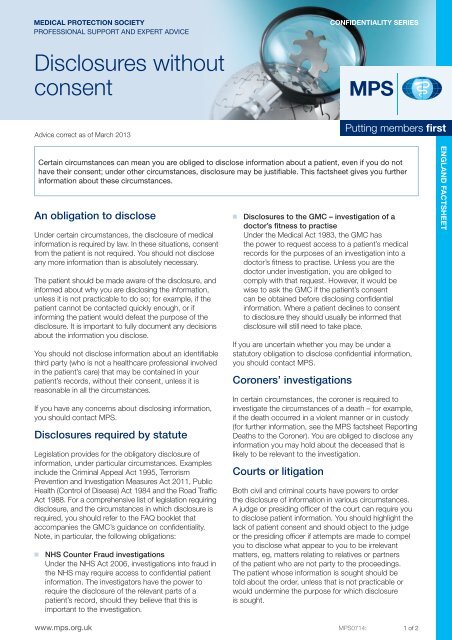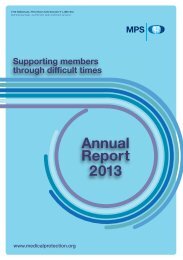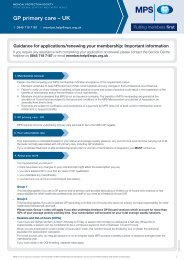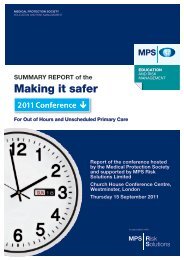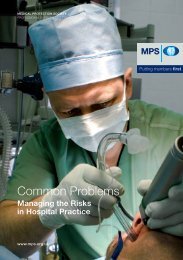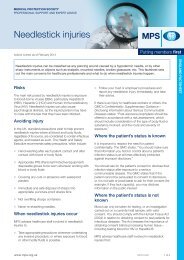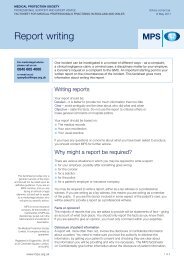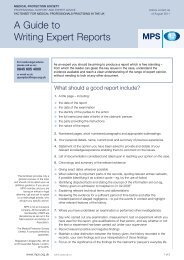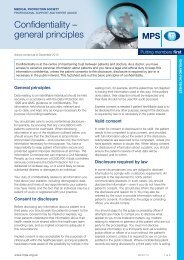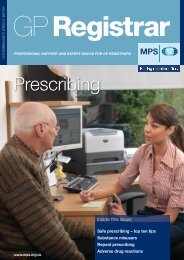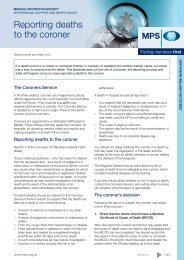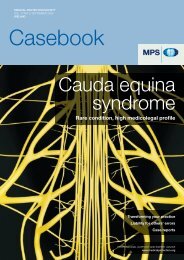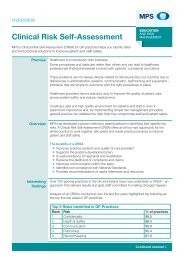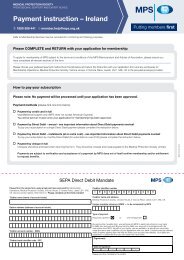Disclosures without consent - Medical Protection Society
Disclosures without consent - Medical Protection Society
Disclosures without consent - Medical Protection Society
You also want an ePaper? Increase the reach of your titles
YUMPU automatically turns print PDFs into web optimized ePapers that Google loves.
MEDICAL PROTECTION SOCIETY<br />
PROFESSIONAL SUPPORT AND EXPERT ADVICE<br />
CONFIDENTIALITY SERIES<br />
<strong>Disclosures</strong> <strong>without</strong><br />
<strong>consent</strong><br />
Advice correct as of March 2013<br />
An obligation to disclose<br />
Under certain circumstances, the disclosure of medical<br />
information is required by law. In these situations, <strong>consent</strong><br />
from the patient is not required. You should not disclose<br />
any more information than is absolutely necessary.<br />
The patient should be made aware of the disclosure, and<br />
informed about why you are disclosing the information,<br />
unless it is not practicable to do so; for example, if the<br />
patient cannot be contacted quickly enough, or if<br />
informing the patient would defeat the purpose of the<br />
disclosure. It is important to fully document any decisions<br />
about the information you disclose.<br />
You should not disclose information about an identifiable<br />
third party (who is not a healthcare professional involved<br />
in the patient’s care) that may be contained in your<br />
patient’s records, <strong>without</strong> their <strong>consent</strong>, unless it is<br />
reasonable in all the circumstances.<br />
If you have any concerns about disclosing information,<br />
you should contact MPS.<br />
<strong>Disclosures</strong> required by statute<br />
Legislation provides for the obligatory disclosure of<br />
information, under particular circumstances. Examples<br />
include the Criminal Appeal Act 1995, Terrorism<br />
Prevention and Investigation Measures Act 2011, Public<br />
Health (Control of Disease) Act 1984 and the Road Traffic<br />
Act 1988. For a comprehensive list of legislation requiring<br />
disclosure, and the circumstances in which disclosure is<br />
required, you should refer to the FAQ booklet that<br />
accompanies the GMC’s guidance on confidentiality.<br />
Note, in particular, the following obligations:<br />
■■<br />
Certain circumstances can mean you are obliged to disclose information about a patient, even if you do not<br />
have their <strong>consent</strong>; under other circumstances, disclosure may be justifiable. This factsheet gives you further<br />
information about these circumstances.<br />
NHS Counter Fraud investigations<br />
Under the NHS Act 2006, investigations into fraud in<br />
the NHS may require access to confidential patient<br />
information. The investigators have the power to<br />
require the disclosure of the relevant parts of a<br />
patient’s record, should they believe that this is<br />
important to the investigation.<br />
■■<br />
<strong>Disclosures</strong> to the GMC – investigation of a<br />
doctor’s fitness to practise<br />
Under the <strong>Medical</strong> Act 1983, the GMC has<br />
the power to request access to a patient’s medical<br />
records for the purposes of an investigation into a<br />
doctor’s fitness to practise. Unless you are the<br />
doctor under investigation, you are obliged to<br />
comply with that request. However, it would be<br />
wise to ask the GMC if the patient’s <strong>consent</strong><br />
can be obtained before disclosing confidential<br />
information. Where a patient declines to <strong>consent</strong><br />
to disclosure they should usually be informed that<br />
disclosure will still need to take place.<br />
If you are uncertain whether you may be under a<br />
statutory obligation to disclose confidential information,<br />
you should contact MPS.<br />
Coroners’ investigations<br />
In certain circumstances, the coroner is required to<br />
investigate the circumstances of a death – for example,<br />
if the death occurred in a violent manner or in custody<br />
(for further information, see the MPS factsheet Reporting<br />
Deaths to the Coroner). You are obliged to disclose any<br />
information you may hold about the deceased that is<br />
likely to be relevant to the investigation.<br />
Courts or litigation<br />
Both civil and criminal courts have powers to order<br />
the disclosure of information in various circumstances.<br />
A judge or presiding officer of the court can require you<br />
to disclose patient information. You should highlight the<br />
lack of patient <strong>consent</strong> and should object to the judge<br />
or the presiding officer if attempts are made to compel<br />
you to disclose what appear to you to be irrelevant<br />
matters, eg, matters relating to relatives or partners<br />
of the patient who are not party to the proceedings.<br />
The patient whose information is sought should be<br />
told about the order, unless that is not practicable or<br />
would undermine the purpose for which disclosure<br />
is sought.<br />
ENGLAND FACTSHEET<br />
www.mps.org.uk<br />
MPS0714:<br />
1 of 2
Reporting patients to the DVLA<br />
The Driver and Vehicle and Licensing Agency (DVLA) is<br />
legally responsible for deciding if a person is medically<br />
unfit to drive, and needs to know if a driver has a<br />
condition, or is undergoing treatment that may now, or in<br />
their future, affect their safety as a driver. The driver is<br />
legally responsible for informing the DVLA about such a<br />
condition or treatment. If a patient refuses to accept the<br />
diagnosis or will not inform the DVLA, you should speak<br />
to them, and if they continue to drive against your advice<br />
you should contact the DVLA and disclose any relevant<br />
information.<br />
Justifiable disclosures in the public<br />
interest<br />
The disclosure of information about a patient <strong>without</strong><br />
their express <strong>consent</strong> may be justifiable, if the public<br />
interest in disclosing the information outweighs the<br />
patient’s interests in keeping it confidential.<br />
In all cases, you must decide whether or not the possible<br />
harm caused to the patient – and the overall trust between<br />
doctors and patients – by disclosing this information will<br />
outweigh the benefits resulting from the disclosure.<br />
You should try to ensure that the information is<br />
anonymised, if practicable, and that you are only<br />
disclosing information relevant to the purpose of the<br />
disclosure. Only in exceptional circumstances should<br />
non-anonymised data be disclosed.<br />
You should attempt to seek the patient’s <strong>consent</strong>, but<br />
there are certain circumstances when this will not be<br />
possible – for example, if the patient lacks capacity, you<br />
are not able to trace the patient, obtaining <strong>consent</strong><br />
undermines the purposes for which the disclosure was<br />
being made, or the disclosure must be made quickly, such<br />
as cases of detection or control of communicable diseases.<br />
It is important to document any decision you make and<br />
your reasons for disclosing the information.<br />
<strong>Disclosures</strong> to protect the patient or<br />
others from harm<br />
The disclosure of a patient’s personal information may<br />
be in the public interest, if it is likely to protect individuals<br />
or society from risks of serious harm, such as serious<br />
communicable diseases or serious crime, to reduce the<br />
risk of death or serious harm to the patient or a third<br />
party, or as a result of gunshot or knife wounds.<br />
If it has not been possible to seek the patient’s <strong>consent</strong>,<br />
you may disclose personal information <strong>without</strong> <strong>consent</strong> if<br />
the benefits to an individual or to society of the<br />
disclosure outweigh both the public and patient’s<br />
interest in keeping the information confidential.<br />
If the patient has refused <strong>consent</strong> to the disclosure, you<br />
should consider any reasons provided by the patient. If<br />
you still consider that disclosure is necessary to protect<br />
a third party from death or serious harm, you should<br />
disclose information promptly to the appropriate person<br />
or authority.<br />
The ultimate decision about whether or not a disclosure<br />
was made in the public interest is determined by the<br />
courts. If you do disclose the information, and are<br />
required by the GMC to justify your decision, you need<br />
to ensure that your reasons are clearly documented.<br />
However, if the purpose of the disclosure is to protect an<br />
incompetent patient from serious harm, there is an<br />
expectation that you will disclose the relevant<br />
confidential information – and if you chose not to<br />
disclose the information, you may be required to justify<br />
why you did not do so.<br />
Communicable diseases<br />
If a patient refuses to allow you to inform someone<br />
outside the healthcare team of their infection status, you<br />
must respect their wishes unless you consider that<br />
failure to disclose the information will put healthcare<br />
workers or other patients at risk of infection.<br />
You should pass information about serious<br />
communicable diseases to the relevant authorities for<br />
communicable disease control and surveillance, using<br />
anonymised information if practicable.<br />
Further information<br />
■■<br />
■■<br />
■■<br />
■■<br />
■■<br />
■■<br />
■■<br />
GMC, Confidentiality (2009) – www.gmc-uk.org<br />
GMC, Supplementary guidance – Confidentiality:<br />
Reporting Concerns About Patients to the DVLA or<br />
DVA (2009) – www.gmc-uk.org<br />
GMC, Supplementary guidance – Disclosing<br />
Information About Serious Communicable Diseases<br />
(2009) – www.gmc-uk.org<br />
GMC, Supplementary guidance – Reporting Gunshot<br />
and Knife Wounds (2009) – www.gmc-uk.org<br />
MPS factsheet, Reporting Gunshot And Knife<br />
Wounds – www.medicalprotection.org/uk/factsheets<br />
GMC, Making and Using Visual and Audio<br />
Recordings of Patients – Guidance for Doctors (2011)<br />
– www.gmc-uk.org/recordings<br />
DH, “Striking the Balance”: Practical Guidance on the<br />
Application of Caldicott Guardian Principles to<br />
Domestic Violence and MARACs (Multi Agency Risk<br />
Assessment Conferences) – www.dh.gov.uk<br />
ENGLAND FACTSHEET<br />
For medicolegal advice please call us on:<br />
0845 605 4000<br />
or email us at: querydoc@mps.org.uk<br />
This factsheet provides only a general overview of the topic and should not be relied upon as definitive<br />
guidance. If you are an MPS member, and you are facing an ethical or legal dilemma, call and ask to speak<br />
to a medicolegal adviser, who will give you specific advice.<br />
MPS is not an insurance company. All the benefits of membership of MPS are discretionary as set out in the<br />
Memorandum and Articles of Association. The <strong>Medical</strong> <strong>Protection</strong> <strong>Society</strong> Limited. A company limited by<br />
guarantee. Registered in England No. 36142 at 33 Cavendish Square, London, W1G OPS.<br />
www.mps.org.uk<br />
Image © Günay Mutlu / iStockphoto.com<br />
MPS0714:<br />
2 of 2


